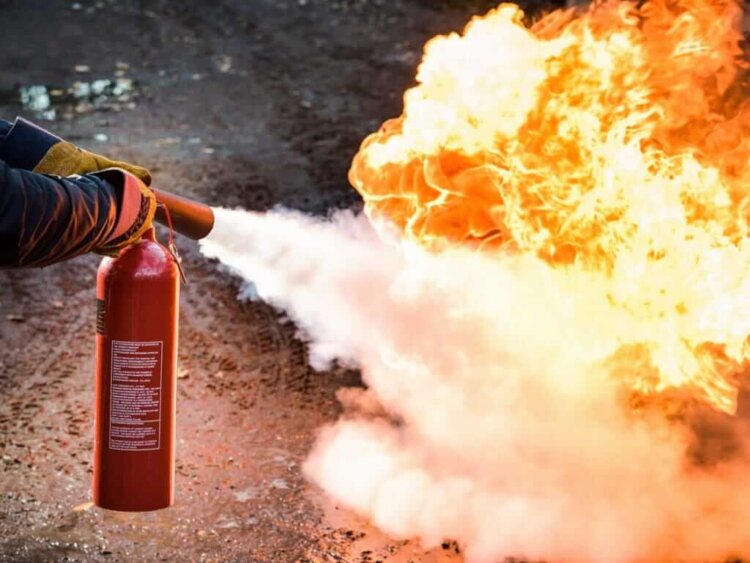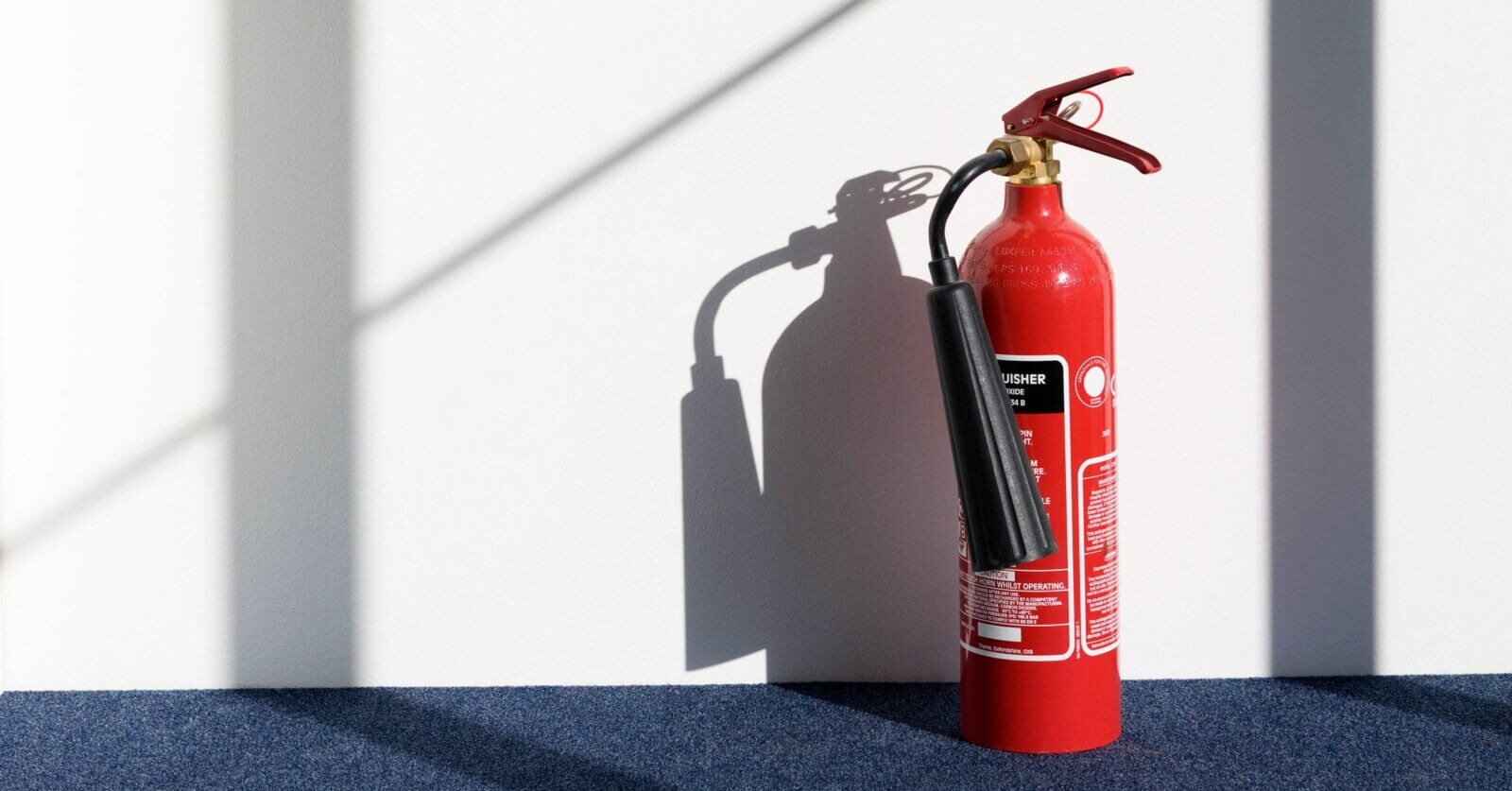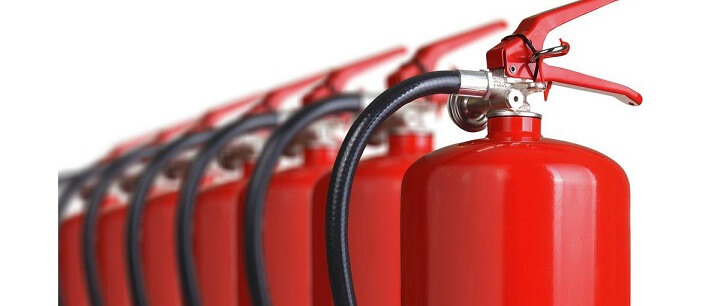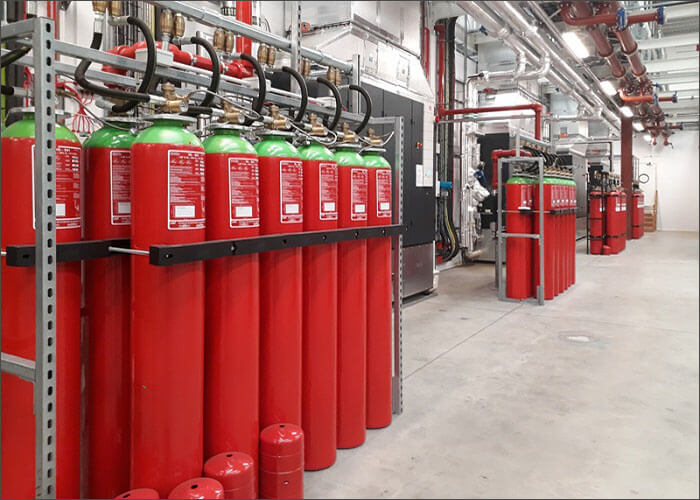Fire Extinguisher vs. Fire Suppression: What You Need to Know
February 24, 2023
When it comes to fire safety, many people are under the impression that a fire extinguisher is all they need. However, this is not always the case since, in some instances, fire suppression may be a better option.
In this blog post, we will compare fire extinguishers and fire suppressions to help you decide which one is right for you!
Fire Extinguisher
A fire extinguisher is a device that is used to put out small fires. It is a handheld device and is usually made of metal, often with a hose attached to it which expels extinguishing agents such as water or foam onto the fire when the trigger is pressed. It is a pretty popular and the most common fire protection tool you will find in households, commercial buildings, and even vehicles.
Fire extinguishers come in different sizes and they are also rated for different types of fires. While some fire extinguishers are made for grease fires or electrical fires, there are also general-purpose fire extinguishers that can be used on most types of fires.

Why Choose a Fire Extinguisher?

There are many reasons why you should get a fire extinguisher for your home.
Portability
They are very portable and can easily be carried wherever there is a small fire to put out. Some fire extinguishers even come in canisters which makes carrying them not an issue even for a small child. Their portability proves to be really helpful too because it allows people to have them in all vehicle sizes as a way to control fires.
Inexpensive and Accessible
Fire extinguishers are also relatively inexpensive. You can purchase one for only a few hundred dollars. You don’t even need to search far and wide to get one because you can easily buy a fire extinguisher online or at the nearby hardware or home-improvement store.
Easy to Use
Fire extinguishers are user-friendly too. If you previously had the chance to handle one, then you know that it requires little to no training to operate. In fact, all you need is to remember the acronym PASS (Pull, Aim, Squeeze, Sweep) which stands for the steps to take so you can successfully use it.
However, it still pays to go through basic training on how to use one to prevent accidents and injuries. Another way is to join fire drills which aim to provide the necessary knowledge on how to use such a device in case of fire.
Helps Control the Fire
The main purpose of having a fire extinguisher is to put out a small fire and prevent it from spreading. Having this in your home not only will save lives but will also help lessen the destruction of your property.
But while fire extinguishers serve as an important part of any home safety plan, they do have some disadvantages as well. Here are three of the most important ones to keep in mind:
1. They may not be effective against all types of fires.
This is most especially for instance when the fire started was ignited by flammable liquids like gasoline or oil. Such will likely spread too quickly for a fire extinguisher to be effective.
2. They can be dangerous if not used properly.
If the fire extinguisher is not aimed correctly, the spray can bounce back and hit the person using it, potentially causing injuries. Some types of extinguishers use harmful chemicals that can be dangerous if inhaled or if they come into contact with skin.
3. They can be expensive to maintain and replace.
Fire extinguishers need to be recharged after they are used, and they have a limited shelf life. Once a fire extinguisher expires, it needs to be replaced, especially those with chemicals since this can become less effective over time.
Homeowners will need to regularly check their extinguishers to make sure they are properly charged and in good working order.
Fire Suppression

Fire suppression, on the other hand, is a system used to extinguish fires, or prevent their spread. Like a conventional fire extinguisher, fire suppressions are also classified according to their method of extinguishing a fire. Among the most common types of fire suppression include water, foam agents, dry chemicals, carbon dioxide, and inert gasses.
Water is the most common type of fire suppression. It is inexpensive and can be delivered in large quantities. It can be dispersed by means of hoses, fire sprinkler systems, or nozzles.
Foam functions as a fire suppression too. It has the ability to coat the fuel surface, preventing the fire from spreading.
There are also dry chemical fire suppressions that are great in extinguishing class A, B, and C fires, and inert gasses which are effective in helping put out fires particularly in computer rooms and server rooms without damaging any equipment. Lastly, there is carbon dioxide as well which effectively kills the fire through the removal of oxygen which it needs to flourish.
Why Should You Consider Fire Suppression?

There are several advantages that come with having a fire suppression system installed in your home.
Prevent the Spread of Fire
A fire suppression system is known to be effective in preventing the spread of fires by suppressing them at their source. The water or chemicals it incorporates can help to douse the flames quickly without the fear of them reigniting which means fewer problems for you.
Can Be Automated
The main advantage of a fire suppression system is that it can be automated. This means that it can extinguish a fire without anyone having to be present to operate them manually.
This is often vital in large commercial or industrial premises where a fire could quickly spread and it may not be possible to evacuate everyone in the event of a fire.
Using it Poses Fewer Risks
A fire suppression system poses fewer risks to you in case of fire. This is because you don’t need to come within a certain distance from the fire just to use it, which can be really dangerous since fires are often accompanied by sparks and blasts that can cause life-threatening injuries.
Saves Money from Insurance Premiums
You may not know it but getting fire suppression installed is often seen as reducing the risk of a fire occurring. This allows you to save money on insurance premiums. Not to mention, the peace of mind it offers knowing that you have taken steps to protect your home and family from the dangers of fire.
Fire suppression systems are becoming more and more popular in homes across the country. But while they offer a number of benefits, they also have a few disadvantages that homeowners should be aware of before making a decision about whether to install one in their home. Some of them are listed below:
1. They can be expensive to install and maintain.
Fire suppression systems can be expensive to install, especially if your home doesn’t already have the necessary plumbing in place. And once they’re installed, you’ll need to regularly test and maintain them to ensure they’re working properly – which can also add up over time.
However, while the initial cost may be higher than a traditional fire extinguisher, over the long run, a fire suppression system can actually save you money.
2. They can take up a lot of space.
Another potential downside of fire suppression systems is that they can take up a lot of space, especially if you opt for a larger system that covers more square footage. This can be an issue in smaller homes or apartments where every square foot counts.
3. They can be difficult to operate.
Fire suppression systems can be difficult to operate for some people. They often require special training to use them properly, and if you’re not familiar with how they work, it can be difficult to know how to put out a fire using one.
4. They may not be effective in all situations.
While fire suppression systems are designed to be effective in a variety of situations, there are some instances where they may not work as well as you’d like. For example, if a fire starts in an area that’s not covered by the system, it won’t do any good.
5. They can be dangerous if used improperly.
Likewise, if you use a fire suppression system improperly, it can be dangerous. For example, if you use too much water to extinguish a grease fire, the water can cause the grease to splatter and spread the fire.
So Should You Get a Fire Extinguisher or a Fire Suppression?
If you’re considering whether a fire extinguisher or fire suppression system is right for your home, it’s important to weigh the pros and cons of each option before deciding. By understanding the advantages and disadvantages of each, you can make an informed decision that will help keep your family safe in the event of a fire.
However, if you have the resources, it pays to also consider installing both a fire extinguisher and a fire suppression system. After all, there is no such thing as being too careful when it comes to your and your family’s well-being in case of fire.
